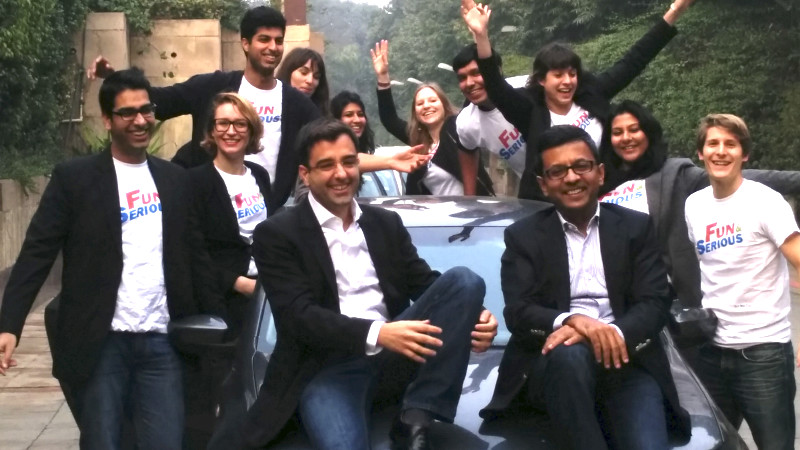Connecting over one hundred thousand cities from Brazil to India and everywhere in between, BlaBlaCar endeavours to be the world’s largest people-powered travel network. As you may have discovered in the previous article, Nicolas Brusson was adamant from the beginning that BlaBlaCar should expand internationally first and focus on profitability later. Why? Because in today’s world, being a national champion of a single market is not enough. People expect global solutions, and if you don’t provide it, somebody else will. This is especially true in Europe which is fragmented across multiple local markets. Instead, Nicolas benchmarked the success stories of Skype, Spotify and SoundCloud, all of which projected themselves into international expansion from an early age.
Eliminating false assumptions is key to success
Launching your business in a new country is never easy. That’s why one of BlaBlaCar’s core values “Never Assume, Always Check” is in place. It helps create the right mindset when expanding into new geographies. It also encourages everyone inside BlaBlaCar to always check everything they do to avoid hundreds of false assumptions being made on a daily basis. With the majority of assumptions tending to be based on beliefs, imaginations, or past experiences, it’s often the case that these assumptions don’t lead to the truth. Instead, teams are advised to cross-check information, actively ask questions and clarify any doubts. By stopping and taking a few more steps before deciding on something means the trap of false assumptions will be avoided and decisions will be based on the right information.

When Brazil first popped up on the map as a possible new market to enter, the team discovered that there was no central train network in place. This could have easily lead to the assumption being made that with no trains available, it would be easy to launch BlaBlaCar. Instead, the team continued their investigative work and soon discovered that planes were the go-to mode of transport between Rio and Sao Paulo with over 90 flights each day, and that there were also several different levels of bus services in place, ranging from basic comfort to luxurious coaches.
Rolling out into a new country takes passion and perseverance
Over the years, BlaBlaCar has built a playbook which holds the recipes of success from previous country launches. Noting everything from failures to new methods, it’s not just a step-by-step guide but living knowledge between teammates. Although no rollout is ever the same, half of the methods can often be replicated from one country to the next.
One thing’s for sure, it takes hard work and diligence to do the necessary fieldwork, to weed out any false assumptions and to build a degree of confidence that the new country in question is the right move for BlaBlaCar. Demographics and macroeconomics such as population size, number of cars in existence, and online behaviour play a huge role and act as relevant indicators. Then comes figuring out how attractive BlaBlaCar would be for drivers, taking into account their purchasing power and how expensive driving is. At the same time, the attractiveness for passengers are realized. Will BlaBlaCar be easy for them to use? Give them a means to travel affordably? Will they actually use it? Before BlaBlaCar launched in Brazil, the team found several Facebook groups with people offering their own carpool services, proving that the demand was already there.
Local insights are invaluable
As the team explores prospective new markets, their mission is to get out there and meet with locals, entrepreneurs and businesses. When the team travelled to India, they carried out various focus groups around the city and were pleasantly surprised to find out that young professionals thought the idea of BlaBlaCar was great. Further exploration showed that they were interested in the social perspective and a new innovative way of travelling.
It’s not unusual for the team to also rent a car and carry out city-to-city trips as well as cross-border trips to neighbouring countries. On the way, they assess how easy it is to cross the border, note the quality of the roads, distance length and study passing cars to get an insight into whether people are travelling alone and if there are empty seats in their cars. Turns out that in India, people rarely tend to travel alone due to expensive petrol and long distances. Instead, they will often search amongst family, friends and neighbours for someone who would like to share the journey. The team at BlaBlaCar quickly realized that carpooling was already happening at a social level in India and felt that by introducing BlaBlaCar they could make even more travel possible by creating more possibilities for both drivers and passengers.
Entering a market and staying locally relevant
After digesting and analyzing all data comes the big question of how to enter. BlaBlaCar combines a mix of three strategies that allow them to have immediate local relevance: Acqui-hire; Spin-off; and building a local team from scratch. Acqui-hire is a powerful model that involves acquiring a local company primarily for its team and their experience. Local teams know the lay of the land and can hit the ground running. They know what people in the street are talking about. They understand consumer’s mindsets, have knowledge of the transport system, and know the competition. They are also the entrepreneurs who created a company themselves, took no salary for the first few years, and have the passion and stamina of running a business with just the belief that it works. BlaBlaCar then gives country managers significant autonomy and the means to achieve their vision on a larger scale. Over the years, BlaBlaCar has continued to acqui-hire and have teamed up with Superdojazd in Poland, Podorozhniki in Russia, Rides in Mexico, Autohop in Croatia, Hungary, Romania and Serbia, and Jizdomat in Czech Republic and Slovakia.

With carpooling still in the early stages of becoming mainstream, it may be that there is no local player in place or acqui-hire is simply not possible. In such a case, either someone from BlaBlaCar moves to the country to launch it or a local team is built from scratch. In the months leading up to the go-live date of a given country, launchers from BlaBlaCar travel there to share their knowledge and guide the team through the rollout. Throughout the process, as everyone learns and shares more, the playbook gradually expands and diversifies.
And the product?
At BlaBlaCar, there’s a fine balance in keeping the consistency of the product and making sure its localized accordingly. From past experience, the team understand the importance of never assuming that the existing BlaBlaCar product is going to work perfectly in a new country. After the launch in India, the team discovered that there were more concerns on trust and safety than elsewhere. After talking to members, they realized that introducing a mandatory bio (which is not common practice in other countries) on members’ profiles in India would be a very effective way of solving this. With the team continuously striving to provide the best service for members, government iD checks, which you may have read about in the article “The Member is the Boss”, have also been recently implemented on the platform in India which helps to further solve the trust and safety issue.
Over the years BlaBlaCar has learnt that the path to a safe future lies in being aware of the assumptions that are made. Put simply, it’s better to be safe than sorry and verify the assumption before investing lots of energy and resources into a new action. At BlaBlaCar, assumptions don’t run decisions, the facts do.
